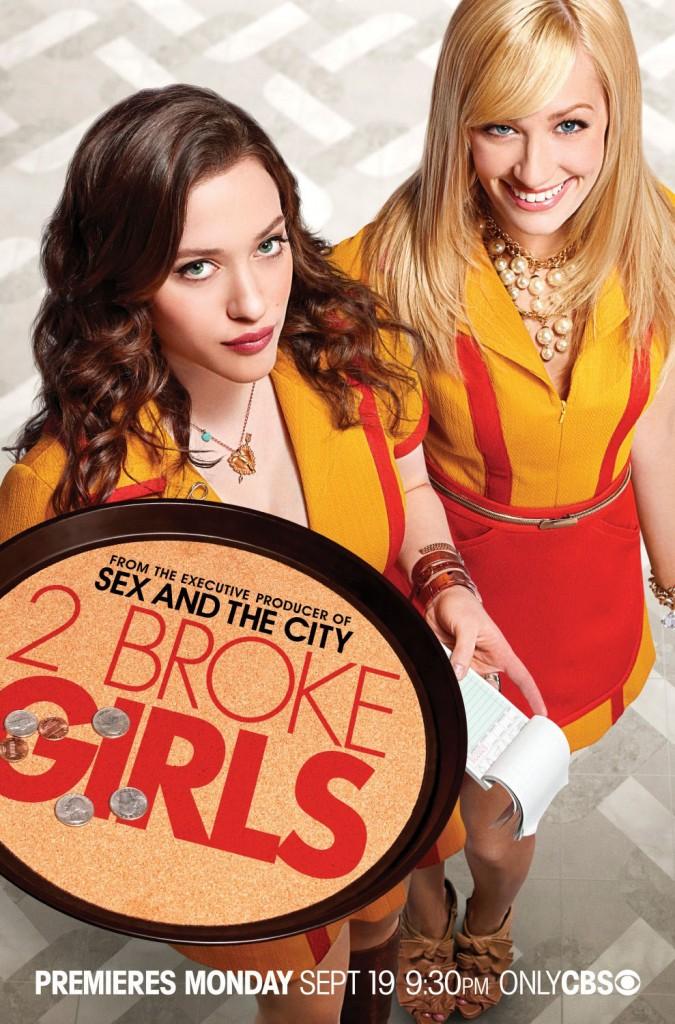Racist Stereotypes Saturate New Show “2 Broke Girls”
November 2, 2011

I had at least moderately high hopes for the ambitiously campaigned, awfully named “2 Broke Girls,” a new sitcom that debuted this fall on CBS. Although I wasn’t a huge fan of the rather tired premise of a once-rich Upper East Sider latching helplessly to a moody, street-smart Brooklynite, I thought that a show helmed by the typically on-point Kat Dennings had hope.
It didn’t take a long time to know that while it wasn’t the absolute wreck it could’ve been, it really wasn’t endearing itself to me, either. The show’s worst offense is not the cliché writing and plot development. It’s the decision to cast two of the supporting characters as one-dimensional shells, whose only contributions to the show are mispronouncing words and reinforcing broad, racist caricatures.
First, there is the Asian owner (actor Matthew Moy) of the diner where the girls work. In my sleuthing, I discovered that in an earlier draft of the pilot, he is named “Rice Lee,” but I guess someone at CBS thought it might be a bit much to name their carelessly constructed Asian stereotype after his most easily associated staple food. So instead, they named him Bryce Lee, to drive home the connection to Bruce Lee, legendary martial arts master and an Asian person, in case we forgot.
Lee appears only to bark out orders in broken English, and doesn’t speak in complete sentences, lest that make him seem too put-together. In the few moments when the girls aren’t lamenting their financial woes, they take time to laugh at his poor grasp of English and cluelessness about American culture.
Even so, at first I thought, they couldn’t possibly have created a character whose sole purpose is to provide comedic relief by mixing his l’s and r’s. But then I heard him say, “Carorine, better check Facebook page! Maybe someone just post to your warr.” Not only is this line a vehicle to deliver his linguistic struggles, but it diminishes him into begging for the friendship of the well-spoken employee who constantly mocks him. It’s a strange turn for the San Francisco-born actor, who previously played an intern on the final season of “Scrubs” and spoke fluent and unaccented English, I might add.
And then there’s Oleg, the greasy short-order cook who hails from somewhere in the Eastern Bloc. He leans suggestively over the stainless steel kitchenware to pout and make unappreciated passes at the girls. Played by American actor Jonathan Kite, Oleg speaks in awkward sentence fragments and seems only to speak so that one of the pretty girls can put him in his place.
Luckily, in order to maintain a steady stream of snarky insults, Oleg can’t be deterred. Each time he’s through offering or begging to provide his body for entertainment, he slinks into the background, not to be heard from again until there’s an opportunity for another squirm-inducing double entendre.
Not only is it surprising to me that CBS would green-light these two poorly developed, utterly embarrassing characters, it’s also confusing. It bewilders me that this show exists on the same network as “The Big Bang Theory,” where Raj Koothrappali (Kunal Nayyar) isn’t confined by ill-conceived stereotypes of Indian culture, but exists as a fully formed character. Although Raj has an accent, it neither consumes his whole personality, nor makes him a racial punching bag.
In comparison, Moy’s and Kite’s characters not only provide no depth to their show, but deprive it of infinitely richer and more enjoyable characters. Such disregard for the implications of their content is an insult to the viewers, and compromises the integrity of the whole network.
What’s more, a show like “2 Broke Girls,” which masquerades ugly racism under the guise of being hip and outspoken, attacks the integrity of the people who these broad characters are supposed to represent.
It suggests that someone’s lack of fluency in the dominant language is reason enough to disparage them or consider them less sophisticated. Meanwhile, these broad characters, constructed without any backbone to defend themselves, are made to smile mindlessly while they wait for the hazing to stop. It’s as if social acceptance hinges on waiting for others to tire of making fun of you.
CBS thinks a viable shortcut to creating watchable fiction is to make one of the characters less able to express themselves. No matter how much he struggles to adapt to the culture, Lee’s purpose on the show will always be to fall short of success. It’s a cheap ploy to provide viewers with a laugh at someone who will never be offended, because they don’t know they should be.
Armed with two pretty girls, CBS has created an outlet for the kind of anachronistic bigotry that I haven’t seen since American actor Mickey’s Rooney’s scowling turn in “Breakfast at Tiffany’s” as the Japanese Mr. Yunioshi, which was no easier to stomach. Fifty years later, we should be eliminating patronizing stereotypes, not writing them back into life.













garconniere • Dec 5, 2011 at 11:29 pm
i entirely, wholeheartedly agree. great article.
Kevyn Totten • Nov 30, 2011 at 12:06 pm
Oh for God’s sake, grow up!! Oh for God’s sake, lighten up!! Oh for God’s sake, get a grip!! Oh for God’s sake, humor is being human enough to make fun of ourselves!!
Have you let that liberal bullcrap saturate your brain???
Not being able to make fun of ourselves… THAT is exactly is what drives a wedge in our society.
So for God’s sake, grow up girlie!!